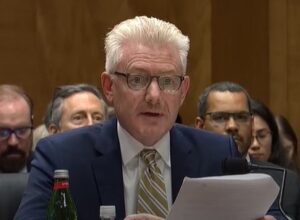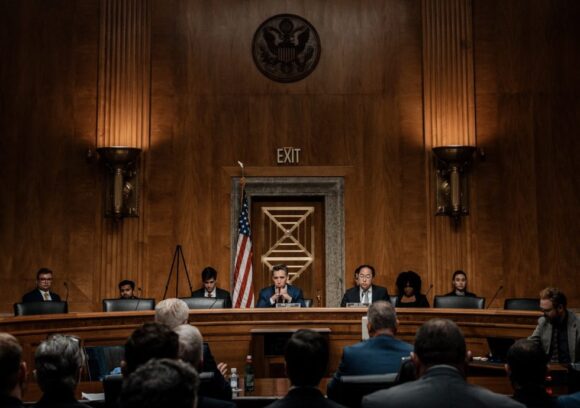It’s not just a few Florida-domiciled insurance carriers that have allegedly altered field adjusters’ reports or low-balled damage estimates in recent years. It’s also major national insurers, according to adjusters and policyholders who spoke at a U.S. Senate hearing marked by drama and political theater.
After hearing testimony from a State Farm policyholder in North Carolina who said his Hurricane Helene-damaged home is still unrepaired, an initial damage estimate had been greatly reduced, and a seemingly unknowledgeable adjuster was sent, State Farm’s operations vice president took the extraordinary step of apologizing during the May 13 Senate subcommittee hearing.
“We have 66,000 employees. We’re human beings. We make mistakes. We made mistakes in the handling of this claim. These actions do not reflect the values of State Farm,” said company Vice President Michael Keating, who stood up and turned to address the insured, Jacob Vertel, of Asheville.
“On behalf of State Farm I want to sincerely apologize to Mr. and Mrs. Vertel,” Keating said, promising to resolve the claim.
But an Allstate executive at the hearing disputed some of the testimony from a Georgia policyholder and adjusters who worked her Helene claim after a massive oak tree fell on the home.
“Some of what you heard today was not accurate,” Allstate’s Mike Fiato, chief claims officer, said during the hearing of the Disaster Management Subcommittee of the Senate Committee on Homeland Security and Governmental Affairs. Fiato noted Allstate settled with the homeowners for about $100,000—something the policyholder did not reveal in her testimony.

Allstate declined to pay an additional $100,000 or more in non-structural or cosmetic restoration work, Fiato explained.
Nonetheless, Sen. Josh Hawley, R-Mo., who has indicated he plans to run for president in 2028, scarcely let Fiato answer questions and accused Allstate of fraud.
“I have to notice that your (Allstate’s) profits have never been better. You made $4.6 billion in profits and your CEO, Tom Wilson, last year was paid $26 million,” said Hawley, chairman of the subcommittee. He asked why the policyholder could not get paid but the company CEO can. Fiato responded that Allstate had, in fact, paid the claim.
“No, you didn’t. You paid a paltry sum,” said Hawley, the former attorney general for Missouri. He went on to demand Fiato reveal his own salary, which Fiato declined to provide.
The dramatic exchange came after two adjusters, one an independent adjuster who was hired by Allstate and the other who has worked mostly for Allstate in recent years, testified that Allstate reviewers or desk adjusters had repeatedly asked them to remove line items from storm damage estimates and to mischaracterize some types of damage.
“I was instructed to attribute cracked tiles to settling, and to show that the roof should be repaired, not replaced,” said independent adjuster Nick Schroeder, who worked the claim for Pilot Catastrophe Services. The roof had widespread damage, rafters were split, and the roof structure needed replacing after the tree fell during the storm, he said.
Schroeder said an Allstate desk reviewer never visited the site, but based his reduction instructions solely on photographs and cost concerns.
After Schroeder declined to change his report, Allstate sent another adjuster to the stately home in Sandy Springs, Georgia. Cliff Millikan, who previously worked with Pilot and has mostly worked Allstate claims since 2016, said his estimates were often reduced inappropriately by company reviewers.
He testified he has seen a shift in Allstate’s claims handling in recent years.
“Since 2020, there have been changes in Allstate’s practices that undermine policyholders and erode trust in the insurance industry,” Millikan said. Allstate has increasingly relied on unlicensed and inexperienced adjusters who do little more than take photos of damaged properties, Millikan alleged.
After Allstate’s corporate reviewers look at the photographs, wholesale changes are made to damage estimates, he noted.
“There’s no transparency,” Millikan said. “This confuses the policyholder. They’ve never had any interaction with the reviewer.” Allstate has essentially stripped qualified field adjusters of their authority to decide what damage should be considered storm-related, he said.
Millikan also testified that when adjusters resist Allstate’s instructions to reduce claims amounts, they get reassigned to another job or are avoided by the carrier.
Fiato said Allstate does not retaliate, and the company does not frequently change field adjusters’ estimates. Schroeder, for example, had turned in 15 claim-inspection reports after Helene, none of which were reviewed or altered by corporate staff.
The adjusters’ assertions echo statements made in recent years by several independent adjusters who worked hurricane claims in Florida and Louisiana. They have said a number of insurance companies have frequently altered reports in ways that made it appear that the field adjusters had drastically reduced their own estimates.
An Allstate spokesperson declined to comment on the hearings or Hawley’s questioning but sent a press release. Neil Alldredge, president and CEO of the National Association of Mutual Insurance Companies, said in the Allstate news release: “American insurers put customers first every day, providing guidance and timely payments when they’re needed most.”
The American Property Casualty Insurance Association also weighed in, noting in a statement that less than 1% of the claims resulting from Hurricanes Helene and Milton produced complaints from insureds. Read more here.
***
Meanwhile, in another meeting room in Washington, a group of Democratic senators simultaneously held a separate hearing on the impact that climate change is having on property insurance premiums and the economy. Josh Levy, mayor of Hollywood, Florida, said climate change is adding stress to “Florida’s broken insurance market.”
Soaring premiums and nonrenewals for relatively young roofs are pushing insureds to the brink, he said. Legislative changes in 2022, designed to reduce excessive levels of claims lawsuits, have not yet produced broad-based rate relief, Levy said, contrary to Florida regulators’ reports that indicate that several carriers have offered minor rate decreases and that multiple new insurers have entered the market.
He called for more government intervention, including reinsurance and catastrophe backstop programs, more regulator oversight and incentives to spur more competition in the property insurance market.
Top photo: Sen. Josh Hawley (center), chairman of the Disaster Management Subcommittee of the Senate Committee on Homeland Security and Governmental Affairs, with New Jersey Sen. Andy Kim. Courtesy hawley.senate.gov
Topics Politics Homeowners
Was this article valuable?
Here are more articles you may enjoy.



 Trump’s EPA Rollbacks Will Reverberate for ‘Decades’
Trump’s EPA Rollbacks Will Reverberate for ‘Decades’  Florida Insurance Costs 14.5% Lower Than Without Reforms, Report Finds
Florida Insurance Costs 14.5% Lower Than Without Reforms, Report Finds  Florida Engineers: Winds Under 110 mph Simply Do Not Damage Concrete Tiles
Florida Engineers: Winds Under 110 mph Simply Do Not Damage Concrete Tiles  How One Fla. Insurance Agent Allegedly Used Another’s License to Swipe Commissions
How One Fla. Insurance Agent Allegedly Used Another’s License to Swipe Commissions 


